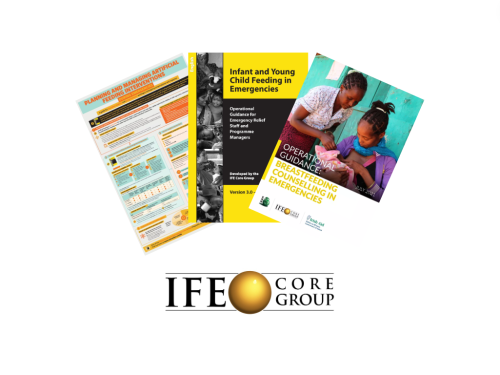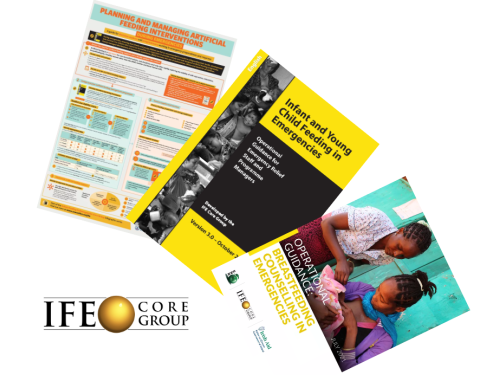A scientific repository
On this page you will find a repository that provides an overview of what peer-reviewed journal articles currently state on Infant and Young Child Feeding (IYCF) in an emergency context. The full repository provides summaries for key publications published since 1 January 2022.
Compiled for the IFE Core Group by: the Johns Hopkins Center for Humanitarian Health at Johns Hopkins Bloomberg School of Public Health, the Friedman School of Nutrition Science and Policy at Tufts University, and the Gillings School of Global Public Health at the University of North Carolina at Chapel Hill. It is maintained in partnership with the Emergency Nutrition Network and with financial support from the USAID Bureau for Humanitarian Assistance.
The repository aims to provide the reader with a snapshot of what is published with updates on a quarterly basis. All publications provide emerging evidence related to IYCF in emergency settings such as natural disasters, conflicts, and displacement including refugee settings.
The repository originates from the identified need to develop a system to compile and share new IYCF-E research and build a virtual library of some of the most recent findings.
The repository now features an interactive dashboard which allows users to search by keyword and filter by type of publication, countries of interest, and selected topic areas (infectious disease, policy, or implementation). Users can switch from dashboard view to the original PDF view by following the link at the top left of the dashboard.
Subscribe to receive receive quarterly updates on the new resources uploaded to the repository
Latest update
23 January 2025
Since our last update in Oct 2024, we have added 12 NEW publications to our scientific repository related to IYCF in emergency settings.
Recent publications provide critical insights into IYCF practices in emergencies, including the role of Human Milk Banks (HMBs), WHO 2024 mpox vaccine guidance for breastfeeding women, position statements from the American College of Obstetricians and Gynecologists and Academy of Breastfeeding Medicine, and challenges implementing IYCF-E in crisis.
Three publications addressed breastfeeding in public health emergencies. A Lancet Global Health correspondence reviewed WHO's 2024 guidance on mpox vaccine, highlighting the safety of the MVA-BN vaccine for breastfeeding women at risk of mpox and advocating for continued breastfeeding during vaccination. The Academy of Breastfeeding Medicine issued a position statement calling for breastfeeding support to be integrated into emergency preparedness plans, including adherence to the International Code of Marketing of Breast-Milk Substitutes (the Code), involvement of breastfeeding specialists, and prioritizing infant caregivers in relief efforts. Similarly, a Committee Statement from the American College of Obstetricians and Gynecologists (ACOG) underscored the critical role of lactation in disaster settings as a crucial strategy to ensure continued infant feeding.
Many new publications highlight the challenges of implementing IYCF practices in crisis and post-crisis settings. A study from Ukraine examined the impact of the ongoing war on breastfeeding practices, focusing on the sustained implementation of the Baby-Friendly Hospital Initiative (BFHI), the role of human milk banks, and barriers to adhering to the Code. Despite war-related challenges, practices such as early initiation of breastfeeding and exclusive breastfeeding at discharge were maintained. However, violations of the Code and overestimation of breast milk substitute (BMS) needs undermined these efforts. Similarly, research from the Türkiye earthquake explored the experiences of breastfeeding mothers in temporary shelters, identifying barriers such as emotional stress, lack of privacy, disrupted social support, and physical injuries that led to breastfeeding cessation.
Malnutrition and dietary diversity among displaced populations were central themes in studies from Somalia and Cameroon. These studies highlighted disparities in dietary diversity and high malnutrition prevalence among young children and mothers, influenced by factors such as displacement frequency, food security, and caregiver education.
Other studies examined infant feeding in migration and displacement contexts. A cross-sectional survey in Ukraine examined IYCF practices among conflict-affected households, revealing those practices remained relatively stable since 2015 but identified challenges with exclusive breastfeeding and continued breastfeeding at 12 months. Complementary feeding practices were largely optimal, though formula distribution in displaced households was linked to suboptimal breastfeeding outcomes. Another study on the 2023 Turkey-Syria earthquakes explored breastfeeding rates among survivors and non-survivors, underscoring the need to support mothers and prioritize breastfeeding during disasters, with artificial feeding as a last resort.
Lastly, a study in Mexico validated the Questionnaire on Breastfeeding Experiences in Migrant Shelters (QEBMS), providing a reliable tool to assess breastfeeding practices, challenges, and experiences among migrant women.
Previous IYCF-E Repository Updates
Since our last update in July 2024, we have added 12 NEW publications to our scientific repository related to IYCF in emergency settings.
Several articles explore various topics affecting infant and young child feeding (IYCF) practices in emergencies and humanitarian settings, including Infant Formula Donations and Code violations, Human Milk Banks (HMB), and conflicting policies for Mpox and breastfeeding.
Several studies discuss breastfeeding amidst the ongoing Mpox outbreak. One correspondence discusses conflicting guidance on breastfeeding during Mpox outbreaks in the Democratic Republic of the Congo (DRC). The article calls for immediate research to clarify if mpox can be transmitted through breast milk. Another correspondence highlights the need for clear guidelines on mpox vaccination for breastfeeding women in the DRC. The article compares this with earlier Ebola guidance in DRC and calls for the urgent inclusion of breastfeeding women in mpox vaccination plans.
A study on commercial milk formula in humanitarian setting explored the distribution of Commercial Milk Formula (CMF) and violations of the International Code of Marketing of Breastmilk Substitutes (the Code) and the Operational Guidance on IYCF. The study revealed systematic violations of the Code and inadequate compliance with IYCF guidelines during the earthquake relief efforts in Türkiye. CMF companies continue to capitalize on crisis to promote their products, using social media platforms. Misleading information about CMF donations spread widely, further contributing to unsafe feeding practices during the emergency. Mothers describe receiving CMF donations despite wanting to breastfeed and voiced concerns about the safety and affordability of continuing CMF use in difficult conditions.
Several studies explore the impact of therapeutic care for malnutrition, national supplementation programs, and natural disasters on IYCF. A study conducted across 12 countries focused on mortality risk in infants receiving therapeutic care for malnutrition reveals that infants aged <6 months with multiple anthropometric deficits present as more severely wasted, stunted, and underweight. Another article focuses on the impact of emergencies on child health, discussing the role of breastfeeding in emergencies and the challenges mothers face during crises. A study from Rwanda evaluated a national food supplementation program’s effectiveness, demonstrating that sustained government commitment, even during the COVID-19 pandemic, led to significant health improvements in child growth. A systematic review examined the effectiveness of postnatal maternal or caregiver interventions on outcomes among infants < 6 m with growth faltering. The study results suggest that breastfeeding counseling, compared to standard care, may increase infant weight at one month, weight at two months, and length at one month.
Lastly, research on Polish Human Milk Banks (HMBs) during the COVID-19 pandemic and the Ukrainian refugee crisis reveals challenges in maintaining donor milk supply. It highlights the absence of structured emergency response procedures for HMBs.
Since our last update in April 2024, we have added 10 NEW publications to our scientific repository related to IYCF in emergency settings.
Several publications explore the impacts of socio-demographic factors, barriers to breastfeeding, natural disasters, and forced migration on IYCF. One study gathered perspective from hotline call logs to describe how an emergency perinatal and infant feeding hotline supported IYCF during natural disasters like hurricanes. Call logs from mothers described family vulnerabilities during a hurricane, running out of donor milk infant formula, and limited access to power and safe drinking water. Staff described training and strategies to provide support, including trauma-informed care, sharing talking points on re-lactation, offering mutual support (such as a "buddy system"), and having familiarity with the local area. An ethnographic study from Canada describes the cultural stereotypes and socioeconomic challenges that refugees face upon migrating to a new country. The study emphasizes the importance of promoting breastfeeding through healthcare support, culturally appropriate services, and interpretation services in healthcare settings. Additionally, implementing Baby-Friendly initiatives is highlighted as a key strategy, with recommendations for collaborative efforts by healthcare settings, healthcare providers, policymakers, public health agencies, service providers, and governments to support the breastfeeding practices of refugee mothers.
Several articles highlight diarrhea as a significant comorbidity of SAM among children. One study describes the characteristics, associated factors, and treatment outcomes among malnourished infants under six months in feeding centers, highlighting the critical need for improved healthcare access and comprehensive education on breastfeeding, hygiene, and nutrition to effectively address SAM. Another study discusses exploring defaulting rates from outpatient care, including strategies to reach vulnerable populations in the management of SAM.
Additional research on commercial milk formula in humanitarian setting explored infant feeding challenges and needs of mothers affected by war. Mothers described facing opposition from healthcare workers at maternity hospitals, where CMF was offered freely even if they wanted to initiate BF right after birth. They also described how they received CMF donations even if they said they did not need them and expressed concerns about being able to continue purchasing CMF or preparing it safely.
A systematic review also explored critical growth gaps among children under six months. The review compared weight gain using F-100 and diluted F-100 (DF-100) with infant formula (IF). The paper highlights recommendations to refocus malnutrition research on supporting and restoring breastfeeding rather than relying on supplemental milk products. It also offers a research framework to guide the design of future studies.
Countries featuring as of July 2024
Africa
- North Africa: Algeria, Egypt, Libya, Morocco, Sudan, Tunisia
- Eastern Africa: Comoros, Djibouti, Eritrea, Ethiopia, Kenya, Madagascar, Malawi, Mauritius, Mozambique, Rwanda, Somalia, Somaliland, South Sudan, Tanzania, Uganda, Zambia, Zimbabwe
- Middle Africa: Angola, Cameroon, Central African Republic, Chad, Congo, Democratic Republic of the Congo, Gabon
- Southern Africa: Botswana, Eswatini, Lesotho, Namibia, South Africa
- Western Africa: Burkina Faso, Côte d'Ivoire, Gambia, Ghana, Guinea, Guinea-Bissau, Liberia, Mali, Mauritania, Niger, Nigeria, Senegal, Sierra Leone
Americas
- North America: Canada, Mexico, United States
- Caribbean: Anguilla, Antigua and Barbuda, Cayman Islands, Cuba, Haiti, Jamaica, Montserrat, Saint Kitts and Nevis
- Central America: Costa Rica, Guatemala, Honduras
- South America: Brazil, Chile, Colombia, Ecuador, Venezuela
Asia
- Central Asia: Kyrgyz Republic, Uzbekistan
- Eastern Asia: China, Japan, South Korea, Taiwan
- Southeast Asia: Cambodia, Indonesia, Laos, Malaysia, Myanmar, Philippines, Singapore, Thailand, Vietnam
- Southern Asia: Afghanistan, Bangladesh, India, Iran, Maldives, Nepal, Pakistan, Sri Lanka
- Western Asia: Armenia, Bahrain, Cyprus, Georgia, Iraq, Israel, Syria, Türkiye, Jordan, Kuwait, Lebanon, Oman, Palestine, Qatar, Saudi Arabia, United Arab Emirates, Yemen
Europe
- Eastern Europe: Belarus, Bulgaria, Finland, Moldova, Poland, Romania, Ukraine
- Northern Europe: Denmark, Estonia, Sweden, United Kingdom
- Western Europe: Albania, Croatia, Greece, Italy, Malta, Portugal, Slovenia, Spain
- Southern Europe: Albania, Belarus, Belgium, Bosnia and Herzegovina, Bulgaria, Croatia
- Western Europe: Belgium, France, Germany, Netherlands, Switzerland
Oceania
- Australia, New Zealand
Several new publications offer guidance for protecting IYCF and nutrition in humanitarian settings, including reviews of current guidelines to identify gaps. This update offers new guidance related to the safety of breastfeeding after exposure to chemical and biological agents used in modern warfare, including safety considerations during treatment and practical guidance for breastmilk testing, monitoring symptoms, safe use of expressed breastmilk, and the minimum amount of time before breastfeeding can safely resume. Other guidelines mention strategies to support breastfeeding, safe alternatives to breastfeeding, facilitating relactation and induced lactation, and complementary feeding in emergency settings. Another review describes facilitators and barriers to wet nursing, contemporary attitudes and beliefs, and strategies to facilitate and support wet nursing in emergencies. Researchers highlighted gaps in current literature, including a lack of practical guidance for small and vulnerable newborns, wet nursing, and strengthening health systems in humanitarian settings.
Other researchers examine the impacts natural disasters and climate change on IYCF. One study describes changes in maternity care and breastfeeding practices following hurricanes Irma and Maria in Puerto Rico, highlighting the important role of healthcare workers in supporting breastfeeding following childbirth, especially when regular breastfeeding and other postnatal services are interrupted. One commentary describes three stages of protecting nutrition following a natural disaster, with specific recommendations for each stage. Another article explores the impact of climate change on breastfeeding, emphasizing the need for region-specific climate action plans that incorporate IYCF.
New publications on IYCF in displaced families include the first known report of successful adoptive breastfeeding in a refugee camp, the impact of financial assistance on child stunting among Syrian refugees in Türkiye, and strategies to reduce the high prevalence of diarrheal illness among young children living in internally displaced camps in Somaliland. Another study explored IYCF knowledge, attitudes, beliefs, practices among refugee, migrant, and asylum seekers in Portugal, noting key differences in IYCF practices between migrant and the host populations and highlighting the need for universal breastfeeding support in hospital settings.
Since our last update in October 2023, we have added 18 new publications to our scientific repository related to IYCF in emergency settings (155 total).
Several new publications focus on the impacts of climate change, natural disasters, and forced migration on IYCF. One article offers a framework for protecting perinatal care and IYCF outcomes in the context of climate-related disasters and forced migration, with recommendations for targeted outreach and information sharing with rural migration hotspots. One study gathered perspectives from MCH workers in the hurricane-affected gulf coast areas of the United States. They described how donated formula quickly ran out and led to rationing and dilution with water, and how infrastructure damage, economic downturn, migration, and a diminished MCH workforce complicated efforts to reach families in need. Another letter to the editor describes the urgency of addressing severe child malnutrition in flood-affected areas of Pakistan, with targeted distribution of ready-to-use foods to health facilities in food-scarce areas.
Other researchers examine the cost-effectiveness and long-term sustainability of humanitarian interventions to prevent child malnutrition. One study compared the cost of providing 6 months of infant formula vs exclusive breastfeeding in humanitarian contexts and estimated the total cost savings of exclusive breastfeeding. Another viewpoint article argues that nutritional supplement programs for young children that use chemical nutrient products should have a clearly defined endpoint so that they do not create an unsustainable reliance on commercial products and undermine larger efforts to increase local food availability.
New research on IYCF in the context of infectious disease examines both the impacts of pandemics on IYCF practices as well as the impact of IYCF practices on disease risk. One study examined the impact of breastfeeding on RSV-related respiratory infection among infants. Others continue to examine the persistence of COVID-19 immunity in breastfeeding mothers, with one study detecting SARS-CoV-2-neutralizing antibodies in breastmilk up to one year post-infection. Interviews with mothers, policymakers, and healthcare workers in Kenya highlighted how the lack of clear guidance related to COVID-19 vaccination during pregnancy and breastfeeding continued to cause confusion and uncertainty. One editorial highlighted how socio-economic disadvantages can magnify breastfeeding inequities during public health emergencies, with specific examples from the COVID-19 pandemic.
Since our last update in July 2023, we have added 21 new publications to our scientific repository related to IYCF in emergency settings (137 total). Several reviews report findings from low- and middle-income countries (LMICs) that are not in emergency settings but offer insights that are widely applicable.
This update provides emerging evidence from: Bangladesh, Belarus, Brazil, Burkina Faso, the Central African Republic, Chad, the Democratic Republic of the Congo, Ethiopia, Gambia, Guatemala, Guinea-Bissau, Honduras, India, Israel, the Kyrgyz Republic, Malawi, Nepal, Pakistan, Palestine, Peru, South Africa, Tanzania, Turkey, Ukraine, the United States, Yemen, and Zimbabwe.
Several new publications shed light on IYCF challenges faced by refugees at all stages of resettlement. A case control study explored factors that contributed to the early interruption of exclusive breastfeeding among mothers residing in five Somali refugee camps in Ethiopia. Another study surveyed healthcare workers to identify IYCF practices, attitudes, and challenges among Syrian mothers resettled in Turkey. Another study interviewed 16 Ukranian mothers about their experiences with IYCF since the onset of the conflict and following their relocation to the US or Israel.
Several new publications examine trends in child wasting and stunting across LMICs, exploring the relationship with IYCF practices and opportunities for targeted interventions. One study of a conflict-affected population in Yemen found significantly higher odds of wasting and stunting among children under 2 years of age, and among those who had never been breastfed. Another study found that declines in child wasting across Chad reversed during the COVID-19 pandemic, with higher burdens of wasting among children under 2 years of age that could not be explained by IYCF practices alone. Pooled analyses across several LMICs examined variations in child wasting and stunting by region, level of rainfall, and country-level factors (health spending, child mortality, and poverty). Results pointed to high rates of stunting and wasting at birth and before the age of 3 months, suggesting a need for targeted nutritional support beyond exclusive breastfeeding and a greater emphasis on pre-natal interventions.
New research continues to highlight the importance of integrating IYCF-E protections into disaster preparedness and emergency management. Case studies from the Honduras, Pakistan, and the United States illustrate how flooding, hurricanes, and unsolicited donations of commercial milk formula have negatively impacted breastfeeding in times of heightened food insecurity. New evidence demonstrates how breastfeeding may lessen the negative effects of in utero exposure to hurricane conditions on the gut microbiome of infants born after the hurricane. These results highlight the importance of protecting breastfeeding at all stages of disaster response and recovery.
Since our last update in April 2023, we have added 40 new publications to our scientific repository related to IYCF in emergency settings.
In addition to several international reviews, this update provides emerging evidence from: Albania, Australia, Bangladesh, Brazil, Bulgaria, Chile, Cyprus, the Democratic Republic of the Congo, Ethiopia, Greece, Kenya, India, Indonesia, Israel, Italy, Malta, Nigeria, Pakistan, Portugal, Spain, Somalia, South Korea, Syria, Taiwan, Thailand, Turkey, Uganda, the United Kingdom, the United States, and Venezuela.
Since our last update in January 2023, we have added 21 new publications to our scientific repository related to IYCF in emergency settings.
In addition to several international reviews, this update provides emerging evidence from: Ethiopia, the United States, Australia, Indonesia, Belgium, India, Lebanon, Pakistan, France, Uganda, Ukraine, Brazil, and Italy.
Since our last update in October 2022, we have added 18 new publications to our scientific repository related to IYCF in emergency settings.
In addition to several international reviews, this update provides emerging evidence from: the United States, Turkey, Cameroon, Ethiopia, India, Lebanon, Pakistan, Nigeria, Afghanistan, Australia, and Yemen.
Since our last update in July 2022, we have added 14 new publications to our scientific repository related to IYCF in emergency settings.
In addition to several international reviews, this update provides emerging evidence from: Turkey, Uganda, Guinea-Bissau, Thailand, Australia, Israel, Brazil, Canada, the United States, Poland, Croatia, Germany, Lithuania, Ukraine, and Indonesia.
Since the 1st of January, 23 peer reviewed articles have been published on IYCF-E.
In addition to international reviews the repository provides emerging evidence from: Iraq, Bangladesh, Colombia, Uganda, Ethiopia, Nigeria, Indonesia, Lebanon, Italy, Turkey, the United States and Australia.
Learn more about IFE Core Group

IFE Core Group
The Infant and Young Child Feeding in Emergencies (IFE) Core Group's vision is that all feeding and care of infants and young children is safeguarded to support child survival, growth and development, in humanitarian contexts.


